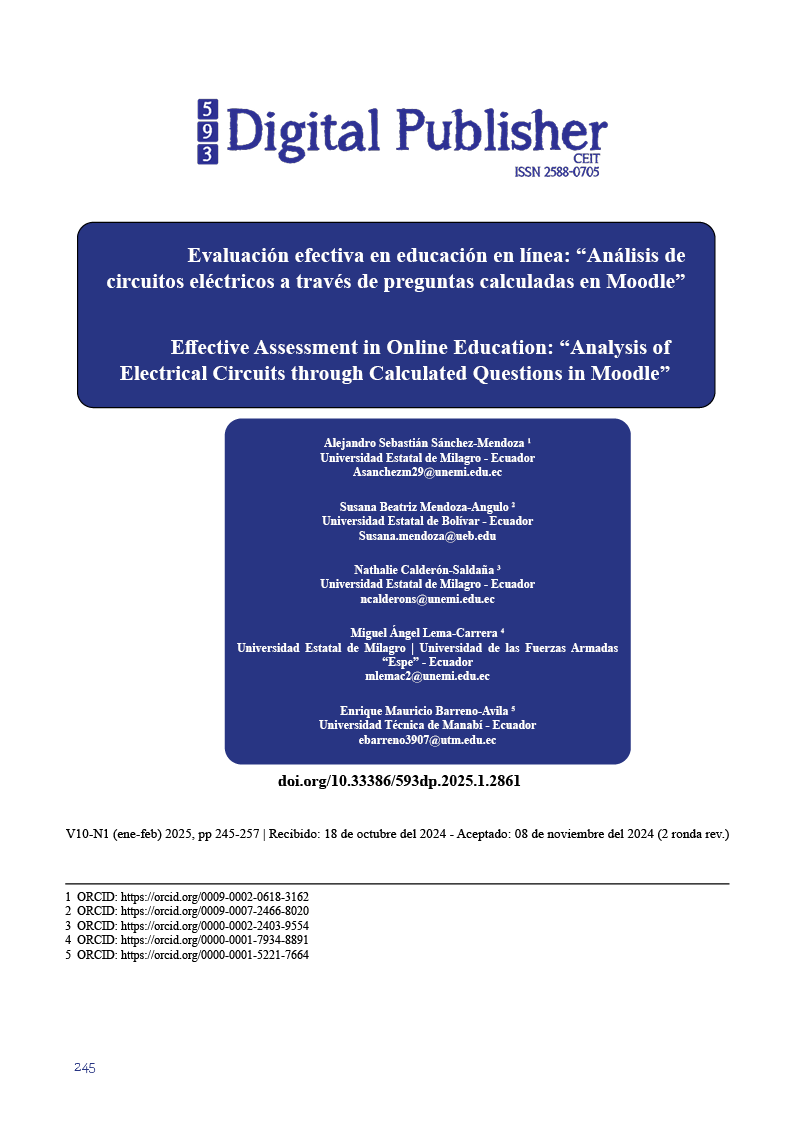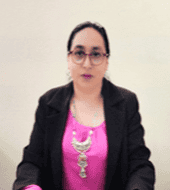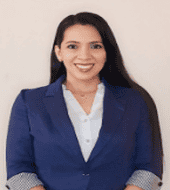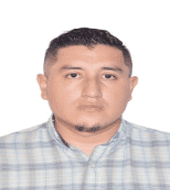Effective Assessment in Online Education: “Analysis of Electrical Circuits through Calculated Questions in Moodle”
Main Article Content
Abstract
Currently, the demand for enrollment in higher education institutions has experienced significant growth, resulting in a series of challenges for universities that have been compelled to adapt both their infrastructure and the capacity of their faculty. In this context, the creation and expansion of online programs has been considered, which not only increases the academic offering but also provides students with the flexibility to access education from anywhere and at any time. However, a major obstacle in this modality is the assessment of students. To address this challenge, the generation of randomly calculated questions for evaluation is proposed, allowing for the development of personalized quizzes based on parameters set by the instructor. This approach facilitates the automatic production of variations in questions during exams. By using this type of questioning, the likelihood of students copying answers from their peers is significantly reduced, as each will receive different values in their questions, compelling them to have a solid understanding of concepts, processes, and formulas to solve the exercises. The learning management system (LMS) Moodle enables the creation of this type of question in XML format; however, the available information for its development is very limited. For this reason, this article provides a guide for its application in the field of electrical circuits.
Downloads
Article Details

This work is licensed under a Creative Commons Attribution-NonCommercial-ShareAlike 4.0 International License.
1. Derechos de autor
Las obras que se publican en 593 Digital Publisher CEIT están sujetas a los siguientes términos:
1.1. 593 Digital Publisher CEIT, conserva los derechos patrimoniales (copyright) de las obras publicadas, favorece y permite la reutilización de las mismas bajo la licencia Licencia Creative Commons 4.0 de Reconocimiento-NoComercial-CompartirIgual 4.0, por lo cual se pueden copiar, usar, difundir, transmitir y exponer públicamente, siempre que:
1.1.a. Se cite la autoría y fuente original de su publicación (revista, editorial, URL).
1.1.b. No se usen para fines comerciales u onerosos.
1.1.c. Se mencione la existencia y especificaciones de esta licencia de uso.
References
Allen, I. E., & Seaman, J. (2017). Distance education enrollment report 2017. Digital learning compass. https://2m08hqel2z.proxynodejs.usequeue.com/fulltext/ED580868.pdf
Arango, S. I., & Manrique, B. (2023). Interacciones comunicativas y colaboración mediada por entornos virtuales de aprendizaje universitarios. Revista de Educación a Distancia (RED), 23(76). https://revistas.um.es/red/article/view/544981
Bendezú, M. (2018). LMS Concepto de sistemas de gestión de aprendizaje.(LMS), tipos y clasificación, importancia, beneficios que brindan los LMS, plataformas virtuales: Moodle, Chamilo, Claroline, Blackboard, Doskeos, Docebo, Edu 20, aplicaciones. https://alicia.concytec.gob.pe/vufind/Record/UNEI_7f32964fb0ebb0dfcdeccce87ed61f9d
Cajamarca, M. A., Cangas, A. L., Sánchez, S. E., & Pérez, A. G. (2024). Nuevas tendencias en el uso de recursos y herramientas de la Tecnología Educativa para la Educación Universitaria. Journal of Economic and Social Science Research, 4(3), 127-150.
Crisol, E., Herrera, L. B., & Montes, R. (2020). Educación virtual para todos: Una revisión sistemática. Education in the knowledge society: EKS. https://redined.educacion.gob.es/xmlui/bitstream/handle/11162/201043/Crisol.pdf?s
Cuesta, I. I., & Alegre, J. M. (2011). Uso de la plataforma Moodle como herramienta para la evaluación continua de estudiantes en el espacio europeo de educación superior. Vivat Academia, 117, 417-428.
Dahlstrom, E., Walker, J. D., & Dziuban, C. (2013). ECAR study of undergraduate students and information technology. https://www.ferris.edu/it/central-office/pdfs-docs/StudentandInformationTechnology2014.pdf
Gibert, R., Naranjo, G. E., Siza, S. F., & Gorina, A. (2024). Enseñanza de la Matemática: Tendencias didácticas y tecnológicas desde la Educación 4.0. Maestro Y Sociedad, 21(1), 1-12.
Floyd, T. (2007). Principios de circuitos eléctricos (8.a ed.). Pearson.
García, M., Pérez, L., & Torres, R. (2021). Impacto de los tipos de evaluación en el rendimiento académico. Revista de Investigación Educativa, 15(2), 80-95.
Garrison, D. R. (2016). E-learning in the 21st century: A community of inquiry framework for research and practice. Routledge. https://www.taylorfrancis.com/books/mono/10.4324/9781315667263/learning-21st-century-randy-garrison
Guadarrama, R. B., Guadarrama, V. R., & Rodríguez, M. E. R. (2015). Circuitos Eléctricos: Teoría y Práctica. Grupo Editorial Patria.
Jara, C. A., Candelas, F. A., Puente, S. T., & Torres, F. (2011). Hands-on experiences of undergraduate students in Automatics and Robotics using a virtual and remote laboratory. Computers & Education, 57(4), 2451-2461.
Laurente, C. M., Rengifo, R. A., Asmat, N. S., & Neyra, L. (2020). Desarrollo de competencias digitales en docentes universitarios a través de entornos virtuales: Experiencias de docentes universitarios en Lima. Revista eleuthera, 22(2), 71-87.
López, J., & Gómez, M. (2019). La evaluación en educación: una revisión crítica de métodos. Revista de Educación y Aprendizaje, 12(1), 40-55.
López, M., & Pérez, J. (2022). Influencia del diseño de evaluaciones en la motivación estudiantil. Revista de Educación y Desarrollo, 50(1), 45-60.
Martínez, A., Pérez, R., & Salinas, C. (2020). Efectividad de las evaluaciones de opción múltiple en el aprendizaje. Educación y Ciencia, 15(2), 120-135.
Ministerio de Educación. (2021). Informe sobre la educación superior en Ecuador. https://educacion.gob.ec/informes
Mishra, P., & Koehler, M. J. (2006). Technological Pedagogical Content Knowledge: A Framework for Teacher Knowledge. Teachers College Record: The Voice of Scholarship in Education, 108(6), 1017-1054. https://doi.org/10.1111/j.1467-9620.2006.00684.x
Moodle. (2024). Tipos de preguntas en Moodle [Software].
Navarro, N. G., Falconí, A. V., & Espinoza, J. (2017). El mejoramiento del proceso de evaluación de los estudiantes de la educación básica. Revista universidad y sociedad, 9(4), 58-69.
Pedrajas, A. P. (2013). Ohm Zone: Un laboratorio virtual para el aprendizaje de la electricidad y la formación del profesorado de secundaria. Alambique: Didáctica de las ciencias experimentales, 75, 76-83.
Ramirez, C. (2021). Enseñanza de la electrónica en entornos virtuales. - Buscar con Google. https://www.google.com.co/search?tbm=bks&hl=es&q=Ram%C3%ADrez%2C+C.+%282021%29.+Ense%C3%B1anza+de+la+electr%C3%B3nica+en+entornos+virtuales.
Rodríguez, S. E., & Muñoz, S. P. (2023). Aplicación de estrategias tecnológicas de información y comunicación para el logro de competencias: Una revisión de la literaria. Revista Científica de la UCSA, 10(2), 151-164.
Rodríguez, J. K., León, J. C., & Pereira, A. M. V. (2022). Neurodidáctica, alternativa de innovación aplicada a estudiantes de educación superior, en el periodo del 2017-2021. https://repositorio.cidecuador.org/handle/123456789/2200
Siemens, G. (2004). A learning theory for the digital age. https://edtechbooks.s3.us-west-2.amazonaws.com/pdfs/133/6849.pdf
Tellería, M. B. (2004). Educación y nuevas tecnologías. Educación a Distancia y Educación Virtual. Revista de teoría y didáctica de las ciencias sociales, 9, 209-222.
Villares, E. F., Toala, F. G., Sailema, B. M., & Gómez, L. J. (2023). La educación a distancia y sus desafíos: Un análisis de las mejores prácticas y estrategias para superar las barreras en el aprendizaje en línea. Ciencia Latina Revista Científica Multidisciplinar, 7(2), 6126-6147.
Viteri, V. V., Benavides, J. P., & Hoyos, C. W. (2022). Generation of calculated random questions with moodle, to evaluate the topic: Interest (i), in a first course of financial mathematics”:“Generación de preguntas aleatorias calculadas con moodle, para evaluar el tema: interés (i), en un primer curso de matemática financiera. South Florida Journal of Development, 3(2), 2220-2238.






